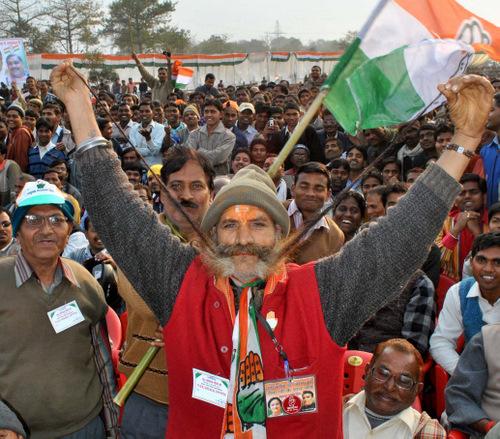India: Uttar Pradesh voter turnout a sign of change?
A Congress party supporter poses for the camera during an state assembly election campaign rally by party president Sonia Gandhi in Allahabad on February 8, 2012. India’s most populous state went to the polls in a contest pitting the scion of the Gandhi political dynasty against the ruling party of local low-caste leader Mayawati.
As India's largest state goes to the polls in an election with heavy implications for the national government, there are signs that various efforts to end the revolving door business of politics as usual may have borne fruit.
The first phase of polling in Uttar Pradesh saw record voter turnout of 62-64 percent, the Times of India reported Thursday, citing Election Commission figures.
But while the paper quotes Chief Election Commissioner S.Y. Quraishi as saying the high turnout resulted from his organization's efforts to register and educate voters, on-the-ground observers with the local press detect a groundswell of change.
The Indian Express, for instance, called the latest round of polls an “aspiration vote,” in its staff editorial Thursday, arguing that both the voters and the major parties have perhaps for the first time focused on the most important issues facing the state – rather than the jingoist formulations of caste and creed.
Of course those same parties have taken caste-and-creed arithametic into account in choosing their candidates – as in all Indian elections it is presumed that voters most often choose “one of their own.” But in their campaign speeches and manifestos, there is a new attention to more substantive concerns in a state that lags behind the rest of India on almost every social and economic indicator.
The Express notes, “…the political contenders in the fray have covered a fair distance since 2007 in responding to [voters'] aspirations. The [Samajwadi Party (SP)], for example, lit up its manifesto five years ago with outrage over computerisation and English-language dominance. Now, the SP has hushed its old linguistic anxieties, its chief, Mulayam Singh Yadav, is seeking to reclaim the law-and-order plank on which [Bahujan Samaj Party (BSP) leader] Mayawati constructed an anti-SP vote in 2007, and its manifesto brims with promises of free laptops and tablets for students. While highlighting its Centrally-moved welfare schemes, the Congress says it will subsidise access to healthcare and legal assistance, besides bringing Muslims under the Mandal framework for [quotas in government jobs and higher education]. The [Bharatiya Janata Party (BJP)] is keeping low-key its [ethnic nationalism] Hindutva outreach and speaking of free electricity and crop insurance to farmers, and subsidised foodgrain for [below poverty line] families. And all parties dwell on an infrastructure vision, with electricity generation as a pivot.”
Similarly, the Hindustan Times observes a momentum swing away from the jingoistic voting of the era following the BJP-orchestrated destruction of the Babri mosque in 1992 — which resulted in nationwide Hindu-Muslim rioting and propelled the Hindu nationalist BJP to power in the central government. “The post-Babri mosque demolition generation of Uttar Pradesh exercised its vote for the first time Wednesday, standing out through sheer numbers without the baggage of the past,” the paper reported, adding that “The large turnout of such first-time voters – many of them not burdened by usual caste considerations – has added an element of suspense to the way the electorate has decided in the first phase of polling for 55 [out of a total 403 assembly] seats.”
"I voted for change," the paper quotes 18-year-old Sunita Singh as saying. "I am interested in politics but sick of the kind that has been happening on caste and religious lines. You watch out. In a few years, politicians will stop this kind of poll mathematics."
Notwithstanding my satirical suggestion that India might function better — and save millions of dollars — if the whole lot of Indian politicians were shifted to the country's many comfortable jails, the Uttar Pradesh elections do matter, as I noted in an earlier post. As India's most populous state, UP accounts for 80 out of 544 seats in the lower house of the parliament (or Lok Sabha), so a change in the political wind there can presage a change in the central government. Moreover, because the legislators in the upper house (or Rajya Sabha) are selected by the members of the state assemblies, and their numbers based on population, the UP election could immediately change the balance of power there.
That said, there could be several reasons for that new optimism in India's usually cynical political sphere. Anti-graft campaigner Anna Hazare – whose mass movement brought tens of thousands of people onto the streets this summer – has paradoxically sparked new enthusiasm for politics with his relentless bashing of the politicians he decries as universally corrupt. The efforts of Congress scion Rahul Gandhi to rebuild the party's moribund base, and launch his own career, through old-style handshaking, mudslinging and baby-kissing, have simultaneously injected a dose of charisma and raised the stakes for the polls. An unprecedented number of new political parties have emerged, such as a host of small, Muslim-oriented parties, which perhaps provided the minority group with a more sincere alternative. And, I would argue, the success of neighboring Bihar – a similar state which under Chief Minister Nitish Kumar has gone from India's worst performing state to boast one of its fastest growing economies – has demonstrated to voters that government can work when steered by competent leaders who possess the political will to institute change.
Only time will tell whether UP can follow Bihar's example. But this year's election results – not due until March 6 – could well mark the first step forward.
We want to hear your feedback so we can keep improving our website, theworld.org. Please fill out this quick survey and let us know your thoughts (your answers will be anonymous). Thanks for your time!
